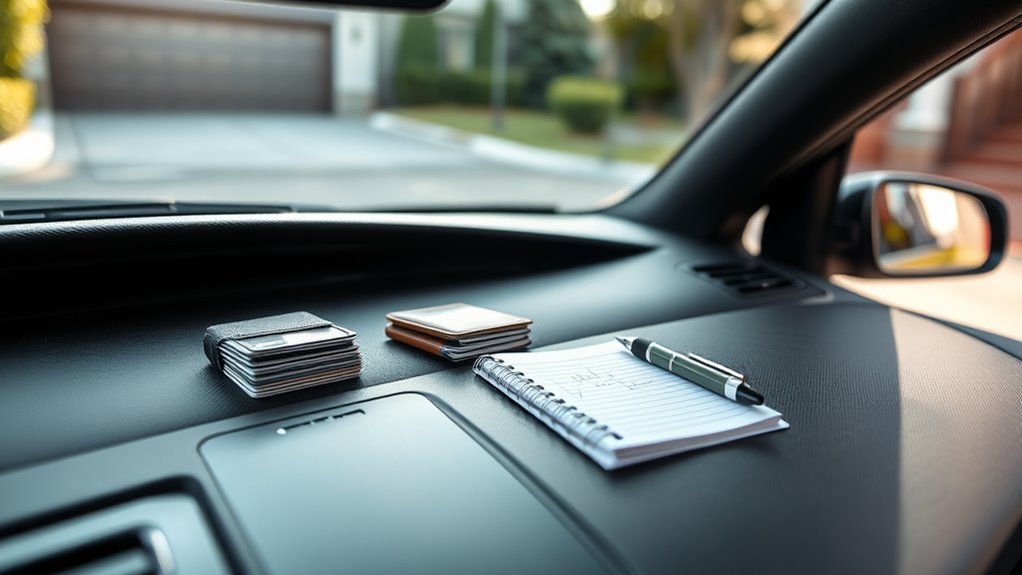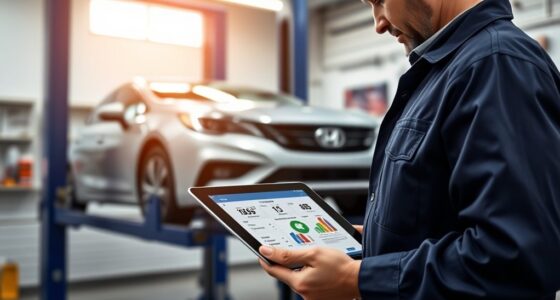To budget for unplanned car repairs, start by establishing an emergency fund that can cover major repairs, such as brake or transmission issues. Contribute a small amount regularly so the fund grows over time. Review your auto insurance to understand what repairs might be claim-eligible and consider routine maintenance to catch problems early. Investing in preventative tools can also help. Keep exploring these strategies to stay prepared for unexpected costs and keep your car in top shape.
Key Takeaways
- Establish an emergency fund dedicated to covering at least 1-2 major repairs.
- Allocate a consistent monthly savings amount specifically for unexpected car expenses.
- Review your auto insurance policy to understand coverage and potential claim benefits for repairs.
- Include routine maintenance costs in your budget to prevent costly emergency repairs later.
- Consider financing options carefully for large repairs, ensuring quick repayment to minimize interest costs.

Unexpected car repairs can strike at any time, leaving you scrambling for funds when you least expect it. When that happens, you might find yourself wondering how to cover the costs without causing financial chaos. The key is to have a plan in place before the unexpected occurs. Building an emergency fund is your first line of defense. This fund acts as a financial cushion, allowing you to pay for repairs without dipping into savings meant for other priorities. Ideally, aim to save enough to cover at least one or two major repairs, which could range from brake replacements to transmission issues. Consistently contribute a small portion of your income to this fund, so it grows over time and is ready when needed.
Another smart strategy involves understanding how insurance claims can help mitigate repair costs. Regularly review your auto insurance policy to see what’s covered and what isn’t. Some repairs, like windshield damage or certain mechanical failures, might be eligible for claims, reducing your out-of-pocket expenses. Filing an insurance claim can be a lifesaver, especially if the repair costs are substantial. Just keep in mind that filing claims might affect your premiums, so weigh the costs and benefits beforehand. Staying informed about your insurance coverage ensures you’re prepared to act quickly when unplanned repairs happen.
In addition to these strategies, setting aside a dedicated budget for car maintenance can help prevent surprises. Allocate a specific amount each month towards routine maintenance tasks, such as oil changes, tire rotations, and inspections. Regular maintenance can catch problems early, saving you money in the long run and reducing the likelihood of emergency repairs. High-quality projectors can also be a helpful investment, as they often include features that alert you to potential mechanical issues before they become costly. When you do face an unexpected repair, having some funds already earmarked for maintenance makes it easier to handle the expense without disrupting your overall budget.
If you do encounter a costly repair that exceeds your immediate savings or emergency fund, explore financing options offered by repair shops or credit cards with low-interest rates. Just be cautious about accumulating debt—use these options only when necessary and ensure you can pay them off quickly. Combining these approaches—maintaining an emergency fund, understanding your insurance coverage, and budgeting for routine maintenance—gives you a thorough plan to handle unplanned car repairs confidently. Preparing in advance minimizes stress and keeps your finances stable, even when the road ahead hits a bump.

Smead All-in-One Emergency Planning Organizer, 13 Pockets, Letter Size, Latch Closure, Poly White/Red (92011)
Provides peace of mind in the event of an evacuation due to weather or environmental conditions
As an affiliate, we earn on qualifying purchases.
As an affiliate, we earn on qualifying purchases.
Frequently Asked Questions
How Much Should I Set Aside for Unexpected Car Repairs Annually?
You should set aside about $500 to $1,000 annually for unexpected car repairs, depending on your vehicle’s age and condition. Building an emergency fund for car issues is essential, and consistent maintenance planning helps prevent major problems. Regularly contribute to this fund to stay prepared, ensuring you’re not caught off guard when unforeseen repairs arise. Adjust your savings as needed based on your driving habits and vehicle type.
Are There Specific Savings Accounts for Car Repair Funds?
Yes, you can use dedicated savings accounts for your car repair funds. An emergency fund is essential—you should keep enough in a separate savings account to cover unexpected repairs. Consider opening a high-yield savings account specifically for your car emergencies. This way, you’re prepared financially without mixing funds with other expenses. Regularly contribute to this account so it grows over time, ensuring you’re ready when repair costs arise.
How Do I Prioritize Repairs if Funds Are Limited?
When funds are limited, start with repair prioritization by addressing urgent safety issues first, like brake or tire problems. Use your emergency fund for these critical repairs to prevent further damage or accidents. Once safety concerns are handled, evaluate remaining repairs by importance and cost, tackling the most essential ones next. Keep a list to stay organized, and save for less urgent repairs over time to ensure your car stays reliable.
Can Car Insurance Cover Some Unexpected Repair Costs?
Yes, your car insurance can cover some unexpected repair costs if you have the right insurance coverage. Check if your policy includes collision, extensive, or specific repair warranties that might help. Keep in mind, insurance usually doesn’t cover routine maintenance, but it can protect you from costly repairs caused by accidents or theft. Review your policy details to understand what’s covered and consider adding repair warranties for extra protection.
What Are the Best Ways to Reduce Repair Expenses?
To reduce repair expenses, follow regular maintenance tips like oil changes and tire checks to prevent issues. Also, consider investing in repair warranties that cover unexpected costs. Avoid neglecting your car’s service schedule, which can lead to costly repairs. Keep an eye on warning lights and address problems early. Staying proactive with maintenance and warranties helps you save money and keeps your vehicle running smoothly longer.

AUTO MAINTENANCE LOG – PLAN: PLAN MAINTENANCES, REPAIRS, SERVICES, FILTERS, FLUIDS, TIRES, BRAKES, MILES AND LOG NOTES!: AUTO MAINTENANCE DIARY – … – LEARN WHEN TO SCHEDULE YOUR NEXT SERVICE.
As an affiliate, we earn on qualifying purchases.
As an affiliate, we earn on qualifying purchases.
Conclusion
By setting aside a dedicated fund for unexpected repairs, you’re fundamentally building a safety net that catches you when life throws curveballs. Think of it as your financial armor—prepared and resilient, ready to face the unforeseen. Remember, no plan is perfect, but with a little foresight, you can turn the chaos of car troubles into just a bump in the road. Stay proactive, and your peace of mind will always steer you right.

You're Approved!: Never Get Turned Down For Credit Again. (Credit Repair Books 2023)
As an affiliate, we earn on qualifying purchases.
As an affiliate, we earn on qualifying purchases.

TLGREEN 95 Piece Tool Set, Tool Kit, Mechanics Tool Set, Portable Toolbox with Adjustable Wrench Pliers Socket Bits, with Plastic Toolbox, for House Apartment Garage (Red)
The tools are heat-treated with carbon steel and placed in a suitable box,compact carrying case for storage and…
As an affiliate, we earn on qualifying purchases.
As an affiliate, we earn on qualifying purchases.








